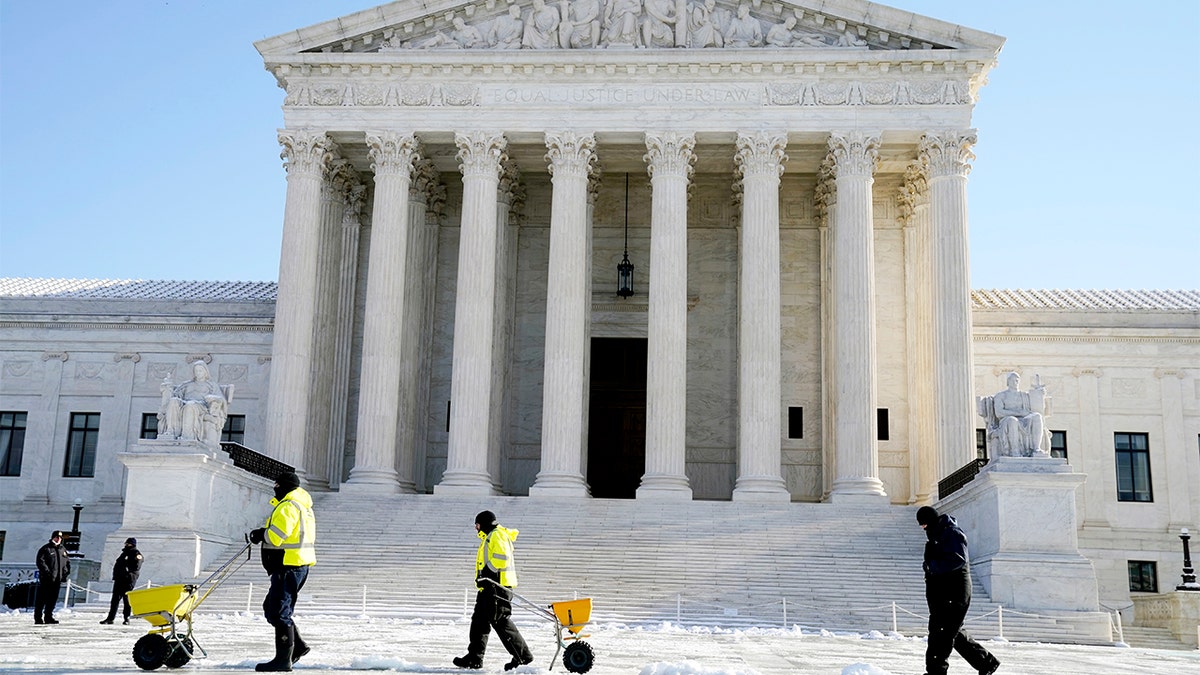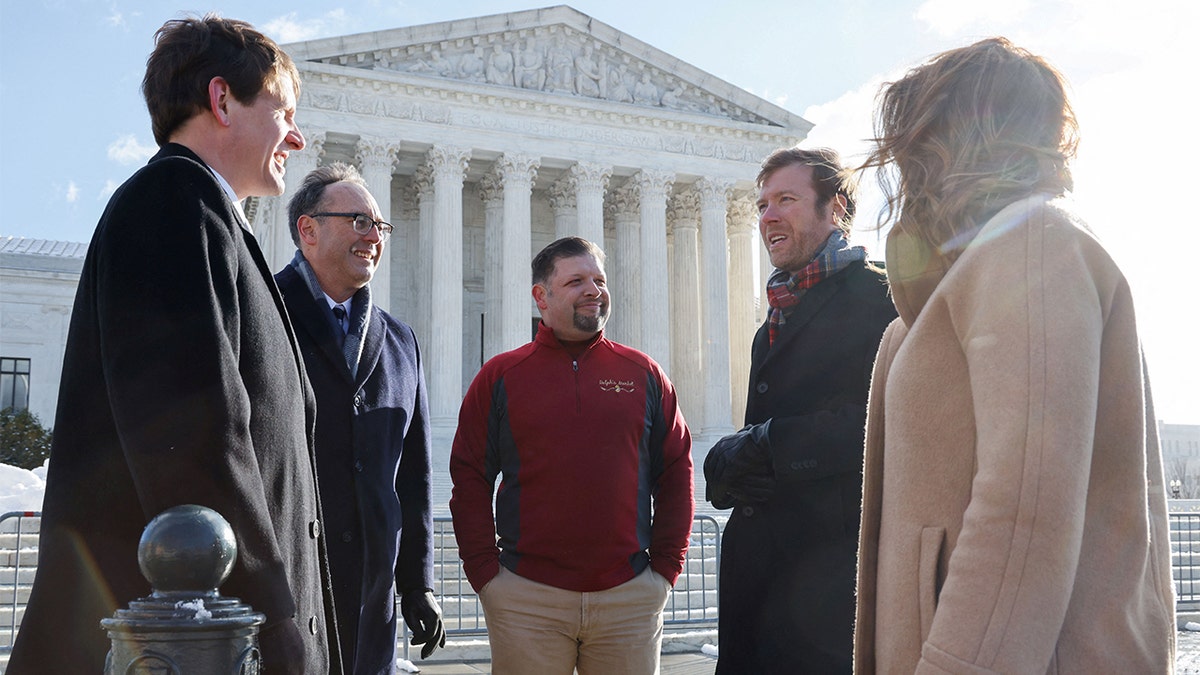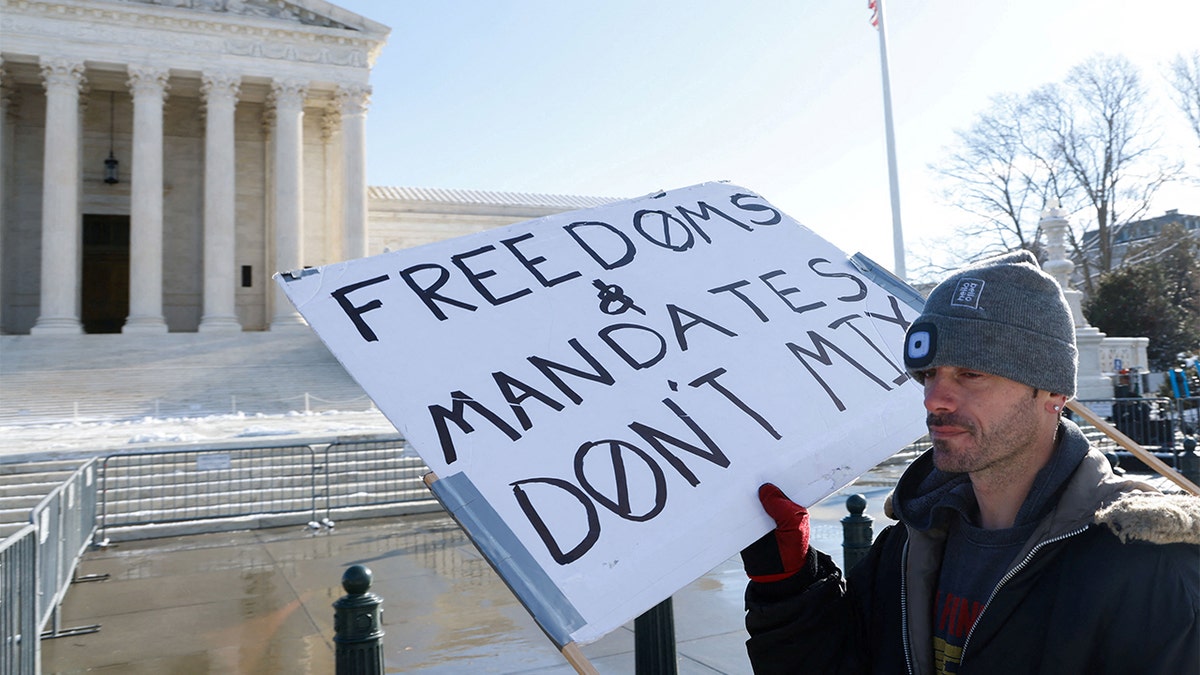The U.S. Supreme Court heard arguments Friday in a high-stakes public session to decide whether the U.S. government can begin enforcing sweeping COVID-19 vaccine requirements affecting nearly 100 million workers.
For three hours and 40 minutes, the justices heard oral arguments over federal vaccine and testing rules for businesses with 100 employees or more, and on vaccine mandates for health care workers at facilities receiving Medicaid and Medicare funding.
Enforcement of the policies, which were announced in November, has been put on hold pending resolution in the high court.
WHAT SUPREME COURT RULING WILL MEAN FOR PRESIDENTIAL AUTHORITY BEYOND VACCINE MANDATES
In early arguments, Chief Justice John Roberts and Justice Neil Gorsuch suggested that government officials had overstepped, with Roberts declaring that it is "hard to argue" that officials had been given the power to act by Congress. Justice Brett Kavanaugh also noted that Congress had yet to pass any type of vaccine statute.
"This is something the federal government has never done before," Chief Justice John Roberts said.

The Supreme Court is shown Friday, Jan. 7, 2022, in Washington. (AP Photo/Evan Vucci)
Justice Amy Coney Barrett went on to suggest that one of the problems with the rule was its broad scope, while Justice Clarence Thomas suggested that the federal government may have greater powers during the pandemic.
But liberal justices on the bench made clear early Friday that they would back the federal mandates – at least as applied to larger businesses.
ARIZONA AG ON VACCINE MANDATE ARGUMENTS IN SUPREME COURT: ‘A DEBATE ABOUT THE CONSTITUTION’
Justice Elena Kagan said that Biden administration officials have shown "quite clearly" that there is not another policy that "will prevent sickness and death to anywhere like the degree that this one will."
Justice Stephen Breyer also said he found it "unbelievable" that it could be in the public interest to put vaccine mandate for employees on hold, as cases of the highly-transmissible omicron variant of COVID-19 surge across the nation, and as hospitals reach capacity.
The high court has the option of issuing a brief administrative order on whether to stay enforcement of the mandate, which could come as early as Friday, or over the weekend. A more complete written ruling explaining its decision would likely come later.
At this point, the Department of Labor's Occupational Safety and Health Administration (OSHA) mask mandate was set to go into effect on Monday, Jan. 7, while its testing mandate is set to kick in next month, on Feb. 9. OSHA has said it would not impose fines on businesses that don't comply before late February.

Brandon Trosclair, who owns grocery stores in Louisiana and Mississppi, poses for photos with his legal representatives before the U.S. Supreme Court hears arguments on his case against the Biden administration's nationwide vaccine-or-test-and-mask COVID-19 mandates, in Washington, Jan. 7, 2022. (REUTERS/Jonathan Ernst)
"Does the federal government object to our taking a couple of days, maybe, to think about this, to digest the arguments before people start losing jobs?" Justice Samuel Alito asked.
The attorney representing the government, Solicitor General Elizabeth Prelogar, argued that OSHA "found there is grave harm every day and the numbers are stark," but later said that if the court believes it needs additional time, it can take it.
"We think that there are lives being lost every day," she repeated, adding that, specifically, for keeping the vaccine mandate for health care workers on hold "will likely result in hundreds or thousands of deaths and serious illnesses from COVID-19 that could otherwise be prevented."
Justice Thomas asked Prelogar whether there are other tools and methods OSHA could have used instead, rather than the vaccine mandate, but Prelogar maintained that the requirement is "the single most effective way of targeting" what OSHA is seeking to combat, including serious illness, transmission and more.
"Vaccination provides protection on all of those fronts," she said.
Justice Alito went on to ask Prelogar about vaccine side effects, while also stressing their safety.
Prelogar said there are some adverse consequences, but maintained they are minimal compared to COVID-19.
When asked whether OSHA has ever imposed any other regulation that could impose potential adverse health effects on workers, Prelogar said it has not.
Nearly 207 million Americans, 62.3% of the population, are fully vaccinated, and more than a third of those have received a booster shot, including the nine justices.
Meanwhile, as the court heard arguments against vaccine rules for healthcare workers, liberal justices continued to forcefully defend the discretion of the federal government to impose COVID-related mandates.
In a fiery, point-blank exchange, Justice Kagan said: "What the secretary is doing here, is saying to providers, you know what, like, basically the one thing you can't do is to kill your patients. So we you have to get vaccinated so that you are not transmitting the disease that can kill elderly Medicare patients, that can kill sick Medicaid patients."
"I mean, that seems like a pretty basic infection-prevention measure," Kagan continued. "You can't be the carrier of the disease."
Several Republican-led states, business coalitions, religious groups and other opponents have challenged the Biden orders – known as "emergency temporary standards" – as a federal "power grab" that intrudes on their autonomy. They say such sweeping rules cannot be imposed absent specific congressional action.
But the administration and its supporters say the pandemic has created an ongoing nationwide crisis that has killed more than 800,000 Americans, and that federal agencies have the power to impose rules protecting the health and safety of all workers.

A lone protester stands outside the U.S. Supreme Court as it hears arguments against the Biden administration's nationwide vaccine-or-test-and-mask COVID-19 mandates, in Washington, Jan. 7, 2022. (REUTERS/Jonathan Ernst)
The issue represents not only the current administration's evolving response to the pandemic but also could serve as a legal template to the regulatory limits of the governments across a range of future disputes over executive authority. It also represents the question of what powers do federal – and state – governments have in a national emergency.
A federal appeals court last month had ruled the federal government could enforce its "shot-or-test" rules for business with 100 or more employees, requiring them to be fully vaccinated, get tested weekly and wear masks at all times. That could affect 84 million American workers, and had been scheduled to go into effect this week.
Other federal courts have blocked a separate mandate in 24 states. It requires a broad range of health care workers at facilities that participate in the Medicare and Medicaid programs to be fully vaccinated against COVID-19 unless they are eligible for a medical or religious exemption.
That policy would affect an estimated 17 million workers, and was also set to fully go into effect this week.
The Justice Department in its brief with the high court said most such workers have voluntarily been vaccinated, but that the policy needed to apply to all those working in about 76,000 health care facilities, as well as home care providers.
CLICK HERE TO GET THE FOX NEWS APP
"That requirement will save hundreds or even thousands of lives each month," said the administration, urging the high court "to allow the [Health and Human Services] Secretary’s urgently needed health and safety measure to take effect before the winter spike in COVID-19 cases worsens further."
The White House in a statement said, "We are confident in the legal authority for both policies and DOJ will vigorously defend both at the Supreme Court."
Fox News' Shannon Bream and Bill Mears, and The Associated Press contributed to this report.

























